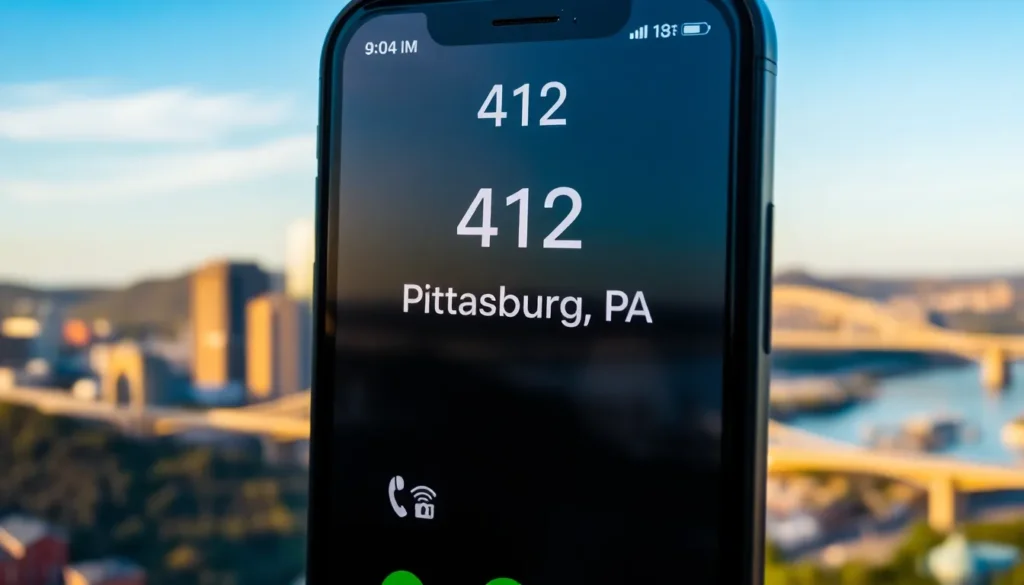Table of Contents
ToggleCurious about the mysterious number 4124235198? You’re not alone. This unique sequence has sparked interest across various online platforms, with many seeking to understand its significance or origin.
While at first glance it might appear to be just a random string of digits, 4124235198 has generated numerous inquiries from those who’ve encountered it in different contexts. Whether it’s appeared in an unexpected message, shown up as an unknown caller, or been referenced in digital content, people want answers about what this number represents.
In this comprehensive guide, we’ll explore the possible meanings behind 4124235198, examine common scenarios where it might appear, and provide valuable information for anyone searching for clarity about this specific numerical sequence.
Understanding the Phone Number 4124235198
The phone number 4124235198 originates from the 412 area code, which primarily serves the Pittsburgh metropolitan area in Western Pennsylvania. This 10-digit sequence follows the standard North American Numbering Plan format (NPA-NXX-XXXX) used throughout the United States, Canada, and several Caribbean countries.
Breaking down 4124235198:
- Area Code (412): Covers Pittsburgh and immediate surrounding areas
- Exchange Code (423): Identifies a specific service area within the 412 region
- Line Number (5198): The unique subscriber number
The 412 area code, established in 1947, was among the original 86 area codes implemented in North America. Initially covering all of western Pennsylvania, it’s now concentrated primarily in Allegheny County after several splits to accommodate growing telecommunication demands. The number’s exchange code (423) indicates service through specific carriers operating in the Pittsburgh area.
When receiving calls from 4124235198, caller ID might display “Pittsburgh, PA” or simply “Pennsylvania” depending on your phone’s database. This geographic information helps recipients quickly identify the general origin of incoming calls, though it doesn’t necessarily confirm the caller’s physical location due to mobile number portability and VoIP technologies.
Geographic Origin of 4124235198
The phone number 4124235198 originates from the Pittsburgh metropolitan area in Western Pennsylvania, as indicated by its 412 area code. Pinpointing the geographic origin of this number helps understand its context and potentially identify legitimate callers versus spam or scam attempts.
Pennsylvania Area Code 412 Overview
Area code 412 exclusively serves the Pittsburgh region and immediate surrounding areas in Western Pennsylvania. Established in 1947 as one of North America’s original 86 area codes, it initially covered a larger portion of western Pennsylvania before being condensed primarily to Allegheny County due to population growth and increased telecommunications demand. Pittsburgh’s distinctive topography of rivers and hills has historically influenced telecommunication infrastructure development in the region, with the 412 area code becoming synonymous with the city’s identity. Major neighborhoods covered include Downtown Pittsburgh, Oakland, Squirrel Hill, Shadyside, and South Hills communities.
Common Scam Tactics Associated With 4124235198
The phone number 4124235198 has been linked to various deceptive practices that target unsuspecting individuals. Reports from consumers indicate this Pittsburgh-based number employs several manipulation techniques designed to extract personal information or money from recipients.
Telemarketing and Robocall Patterns
The number 4124235198 frequently employs automated calling systems that deliver pre-recorded messages to thousands of recipients simultaneously. These robocalls typically begin with a brief pause after answering before connecting to an operator, a telltale sign of auto-dialing technology. The callers often claim to represent legitimate organizations such as government agencies, financial institutions, or well-known companies to establish credibility. Common telemarketing scripts include false promises about debt consolidation, extended warranties, or exclusive investment opportunities with “limited-time offers” designed to create urgency. The callers may use soundboard technology that plays pre-recorded responses, making the conversation seem natural while actually following programmed patterns tailored to overcome common objections.
Impersonation Schemes
Scammers using 4124235198 regularly impersonate authority figures to manipulate victims through fear tactics. IRS impersonation represents one of the most prevalent schemes, with callers claiming the recipient owes back taxes and faces immediate arrest unless payment is made. Social Security Administration fraud involves callers stating the recipient’s benefits are suspended due to suspicious activity, requiring verification of personal details. Tech support impersonators claim to be from Microsoft or Apple, alleging the victim’s computer has been compromised and requires immediate remote access for “repairs.” Banking representatives falsely alert customers about “suspicious transactions” on their accounts, requesting card numbers and security codes to “verify identity.” These impersonation tactics exploit trust in established institutions and create artificial emergencies that bypass rational decision-making processes.
Pressure Tactics and Threats
Operators using 4124235198 employ psychological manipulation techniques to force rapid compliance from victims. The scammers create artificial time constraints, claiming offers expire within hours or legal consequences will occur “by the end of the business day.” Intimidation tactics include threats of arrest, deportation, or legal action if immediate payment isn’t made. The callers often prohibit victims from disconnecting the call until the transaction is complete, claiming this would trigger automatic penalties. False scenarios involving family members in distress (“grandparent scams”) exploit emotional vulnerabilities to extract emergency funds. These pressure tactics deliberately trigger stress responses that impair critical thinking, making victims more susceptible to manipulation through artificially manufactured urgency.
How to Protect Yourself From Unwanted Calls
Protecting yourself from unwanted calls from numbers like 4124235198 requires implementing specific preventive measures. These strategies help maintain privacy and reduce the frequency of nuisance calls while ensuring personal information remains secure.
Blocking and Reporting Options
Mobile devices offer built-in call blocking features that effectively filter unwanted calls from numbers like 4124235198. On iPhones, users can block numbers by opening the Phone app, tapping the info icon next to the recent call, scrolling down, and selecting “Block this Caller.” Android users can block numbers by opening the Phone app, tapping the three-dot menu next to the call, and selecting “Block/report spam.” Beyond device settings, call-blocking apps provide enhanced protection with features like spam identification, call screening, and customizable block lists. Popular options include Truecaller, Hiya, and RoboKiller, which maintain extensive databases of known spam numbers.
Reporting suspicious calls contributes to wider efforts to combat phone scams. The Federal Trade Commission (FTC) accepts complaints through their website (ftc.gov/complaint) or via phone at 1-888-382-1222. The Federal Communications Commission (FCC) also maintains a reporting system at fcc.gov/consumers. When filing reports, include the phone number, date and time of call, and details about the caller’s claims or tactics. Telecommunications providers offer additional reporting channels through customer service portals, allowing users to flag suspicious numbers for investigation. These collective reporting efforts help authorities identify patterns and take enforcement actions against persistent offenders.
Legal Rights When Dealing With Suspicious Numbers
Consumer Protection Laws
Consumer protection laws safeguard individuals from deceptive practices by suspicious callers like 4124235198. The Telephone Consumer Protection Act (TCPA) prohibits telemarketers from calling before 8 a.m. or after 9 p.m. and requires companies to maintain do-not-call lists. Violators face penalties of $500-$1,500 per unwanted call. The Truth in Caller ID Act specifically forbids spoofing phone numbers with intent to defraud or harm, carrying fines up to $10,000 per violation. The Fair Debt Collection Practices Act (FDCPA) further protects consumers by restricting debt collectors from harassment, false statements, and calling outside 8 a.m. to 9 p.m. without permission.
Right to Privacy
Phone users have explicit privacy rights when dealing with numbers like 4124235198. The right to opt out of communication applies to most commercial calls, with companies legally required to honor do-not-call requests promptly. Callers must identify themselves at the beginning of each call, stating their name, company, and contact information. For recorded messages, explicit consent is required before telemarketing robocalls can be made to residential or mobile phones. The Do Not Call Registry provides additional protection by making it illegal for most telemarketers to contact registered numbers after 31 days. Privacy violations can be reported to the FTC, FCC, or state attorney general’s office.
Legal Recourse Options
Individuals harassed by suspicious numbers like 4124235198 have multiple legal options available. Small claims court offers a straightforward process for pursuing damages without an attorney for TCPA violations, typically involving filing fees between $15-$100 with potential recovery of $500-$1,500 per call. Class action lawsuits combine similar claims against the same entity, creating more significant impact while sharing legal costs. Cease and desist letters serve as formal documentation requesting immediate stop to unwanted contact, establishing evidence of notification if legal action becomes necessary. For assistance with these options, state consumer protection agencies and legal aid organizations provide free or low-cost guidance to affected consumers.
Documentation Requirements
Proper documentation strengthens legal cases against suspicious numbers like 4124235198. Call logs from phone providers serve as primary evidence, showing exact dates, times, and durations of unwanted communications. Screenshots of text messages or voicemails provide concrete proof of content and context of communications. Written correspondence, including any emails or letters received, should be preserved with original envelopes and postmarks intact. Financial records documenting any transactions or losses resulting from interactions with suspicious callers help establish damages. This documentation proves invaluable when filing complaints with regulatory agencies or pursuing legal action against persistent offenders.
Alternatives to Answering Unknown Calls
Call Screening Services
Call screening services filter incoming calls before they reach the recipient. Google’s Call Screen feature on Pixel phones answers calls automatically and provides real-time transcriptions of the caller’s responses. Users view these transcriptions and decide whether to pick up or dismiss the call without directly engaging with potential scammers. Similarly, AT&T’s Call Protect and T-Mobile’s Scam Shield identify and flag suspicious calls, providing visual warnings like “Scam Likely” before users answer. These services create a protective buffer between users and potentially fraudulent callers from numbers like 4124235198.
Voicemail Strategies
Voicemail serves as an effective screening tool against unwanted calls. Setting up a custom voicemail greeting prompts legitimate callers to leave detailed messages while discouraging spam callers who rarely leave voicemails. Enhanced voicemail features like visual voicemail convert voice messages to text, allowing recipients to quickly scan message content without listening to recordings. This strategy works particularly well for business professionals who receive numerous calls daily, as it prioritizes important communications while filtering out potential scams.
Temporary Phone Numbers
Temporary phone numbers provide an additional layer of privacy when sharing contact information. Apps like Burner, Hushed, and Google Voice generate secondary phone numbers that forward to primary devices. These disposable numbers work for specific time periods or purposes, such as online marketplace transactions, job applications, or dating profiles. When a temporary number receives too many suspicious calls, users simply discard it and generate a new one, effectively breaking the connection with persistent unwanted callers without affecting their primary phone line.
Silent Mode and Do Not Disturb Settings
Phone operating systems offer powerful call management features through Silent Mode and Do Not Disturb settings. These options prevent interruptions from unknown callers while allowing important contacts to reach through. On iPhones, the “Silence Unknown Callers” feature automatically sends calls from numbers not in contacts to voicemail. Android’s “Do Not Disturb” mode includes customizable exceptions that permit calls from favorite contacts or repeated calls from the same number within a short timeframe. These settings create personalized filters that maintain connectivity with important contacts while minimizing disruptions from suspicious numbers.
Conclusion
The number 4124235198 represents more than just a Pittsburgh area code—it’s become emblematic of broader telecommunications challenges facing modern consumers. Armed with knowledge about this number’s origin and associated scam tactics users can now take proactive steps to protect themselves.
From built-in blocking features to specialized apps and legal protections under the TCPA and FDCPA consumers have multiple defense mechanisms at their disposal. Call screening services temporary phone numbers and strategic voicemail management further enhance personal security.
Staying vigilant about suspicious calls doesn’t just protect individuals—it contributes to collective efforts against phone scams. By implementing these protective measures users can regain control over their communications and minimize unwanted disruptions from numbers like 4124235198.




